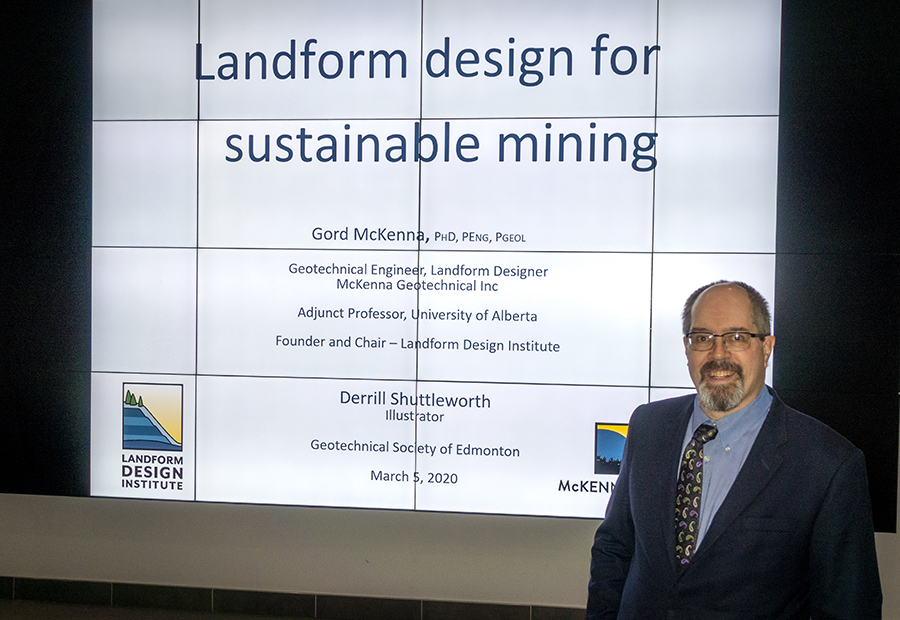Institute embraces online learning
VANCOUVER, BC (March 26, 2020) — Adapting to the social distancing required to combat the spread of COVID-19, the Landform Design Institute (LDI) has produced a six-part, short-video lecture series on landform design for limited release.

Geotechnical Society of Edmonton presentation.
Using PowerPoint slides and narration by LDI founder Gord McKenna, the series covers the current status of mine reclamation, an introduction to landform design, the design team in action, constructing landforms, case histories, and the challenges that lie ahead.
The Institute is initially providing all six lectures to the undergraduate and graduate classes led by Dirk Van Zyl, professor of mine waste management at the University of British Columbia. The first two lectures, “Mining and mine reclamation today” and “Introduction to landform design,” are also now available on the Institute’s website.
McKenna, whose firm, McKenna Geotechnical Inc., sponsored the series, said that the Institute is taking advantage of information technologies to continue sharing knowledge of landform design in a virtual setting. “During these challenging times, this series will let us keep on educating students on ways to move toward responsible and sustainable mining landscape reconstruction,” he said.
The online initiative builds on the recent outreach efforts of the Institute’s members to introduce the principles and practices of landform design to the world, maintaining the momentum sparked by a five-day inaugural graduate-school-level landform design course held last December at the University of Alberta.
Mike O’Kane, an LDI board member and chair of its Technical Advisory Panel, went on the road earlier this year to lead a discussion on mine landform design best practices at the Natural Resources Research Institute of the University of Minnesota in Duluth. O’Kane spoke about the 12 principles of responsibly reclaiming mine lands.

on landform design at the University of Minnesota.
O’Kane described the first principle as “beginning with the end in mind,” or making sure mines start planning for reclamation before mining starts. This means bringing together mine owners, stakeholders, and First Nations to earn one another’s trust and create a shared vision for the reclaimed land. Other principles include setting clear targets in a Design Basis Memorandum (DBM); working simultaneously at the regional, landscape, landform, and element scales; and practising progressive reclamation through “learning by doing” and documenting achievements.
Meanwhile, in Edmonton, McKenna gave a practical “how to” lecture on landform design to the Geotechnical Society of Edmonton. More than 70 local geotechnical practitioners and students from the Northern Alberta Institute of Technology (NAIT) Civil Engineering Technology program and the University of Alberta Civil Engineering program attended. The session included an hour-long introduction to the subject, several case histories, and a question-and-answer session. The lecture complemented two landform design lectures McKenna gave to undergraduate and graduate students at the University of Alberta.
As well, O’Kane and McKenna teamed up in Vancouver on Feb. 12 to record a conversation on the origins, goals, and plans of the Institute. The recording, available on the LDI website, will become the first in a series of podcasts on landform design. The conversation includes personal stories on how they came to realize the importance and necessity of a new approach to reclamation, how landform design differs from common practices, and how they each see it transforming the industry over the coming decade.
Formed in September of 2019, the Institute is an independent not-for-profit organization dedicated to making landform design routine in the mining industry worldwide by 2030. The Institute will hold its first full board meeting as a video conference in April, and will continue delivering on its business plan, including compiling case histories, planning a landform design textbook, producing the podcasts, and organizing additional landform design lectures and courses to keep spreading this important message.
Sign up for the LDI mailing list here.